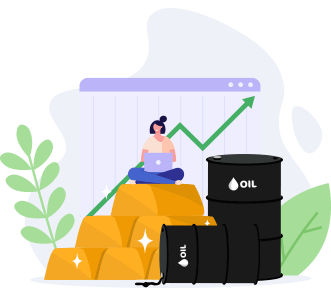Who are Market Makers in Forex? What do they do?

With a daily turnover of over $7 trillion, the forex market is the most liquid in the world. However, despite its size and prominence, many people may not be aware of how this market operates on a day-to-day basis. That's where forex market makers come in.
Enter the forex market makers. Consider market makers as middlemen, setting the bid and ask prices and matching buyers and sellers. So, they are doing a good job. Well, there are arguments from both sides.
In this article, we'll discover who forex market makers are, what they do, and their pros and cons. We'll also delve into the various types of market makers and examine how they operate in practice.
Who Are Forex Market Makers?
Let's start with the basics first! Forex market makers are essential players in currency trading, acting as intermediaries between buyers and sellers and providing liquidity to the market.
These firms are responsible for setting the bid and ask prices for currency pairs, and they stand ready to buy or sell these pairs at any time. The Bank for International Settlements states that market makers account for around 80% of forex trading volume.
Yeah, you read that right! This dominance is due to their crucial role in providing liquidity to the market, ensuring that traders can always find a counterparty to trade with.
Quick question: What is liquidity?
Shoutout to those who answered! For those who didn't, while the term "liquidity" may sound like something out of a science fiction movie, it simply refers to market makers' ability to supply currency pairs to the market and ensure that trading can occur smoothly.
Types of Market makers
When discussing market makers, it's important to understand the types of market makers.
There are two main types of market makers; institutional and retail.
Institutional
These are the largest and most established market makers, typically operating as banks or major financial institutions. They offer high liquidity and competitive bid-ask spreads.
Now the bid/ask spread is different than the chocolate spread we eat. Spread is the difference between the bid/ask prices. Many institutions and brokers provide tighter spreads, like 0.1 pips on major forex pairs.
But here's the catch; market makers are not required to offer the best bid or ask prices.
Instead, they can set prices based on their internal risk management policies and profit objectives. As a retail trader, you may not always get the best deal when trading with a market maker.
So, how can you ensure you get the best possible pricing as a retail trader?
One option is to use an mm broker that offers access to multiple liquidity providers, increasing your chances of getting the best available bid-ask spread for your trades.
Regarding institutions, Citigroup is one of the largest market makers in the forex market. They provide high liquidity and competitive bid-ask spreads to institutional clients such as banks, hedge funds, and other large financial institutions.
Banks are the biggest market makers in the forex market
Retail
These market makers cater to individual traders and smaller financial institutions. They may offer smaller trade sizes and account minimums, but their spreads may be wider than institutional market makers.
For example, MiTrade provides online forex trading services to individual traders. They offer competitive bid-ask spreads, low minimum account balances, and a user-friendly trading platform.
Direct market access | Deal on rising and falling market | 24-hour trading | Limit and stop-loss for every trade
What does the Market Maker do?
You'll be thinking, how do these big players make money?
One of the primary functions of market makers is to set the bid and ask prices for currency pairs. This bid-ask spread represents the market maker's profit and is typically a few pips wide. Speaking of primary functions, let's see what else market makers do.
Setting bid/ask prices
Firstly, they set the bid and ask prices for currency pairs, providing liquidity to the market and ensuring that trades can be executed quickly and efficiently.
According to a Financial Industry Regulatory Authority report, Market makers typically execute trades within seconds.
For example, the market maker might set the bid price at 1.2749 and the asking price at 1.2752. It means they are willing to buy GBP from traders at 1.2749 USD and sell it to traders at 1.2752 USD.
GBP/USD chart showing bid/ask prices
Managing risk
Another key role of market makers is to manage risk. Because they are constantly buying and selling currency pairs, they are exposed to fluctuations in currency prices. To manage this risk, market makers may use hedging strategies.
Maintaining stability
Market makers also play an important role in ensuring market stability. Providing liquidity and maintaining orderly trading conditions help prevent excessive price swings and reduce the risk of market disruptions.
Retail FX Pricing
Regarding forex trading, pricing is among the most important factors. And if you're a retail trader, understanding how retail FX pricing works can give you a competitive edge in the market. You'll be thinking, why are we discussing retail pricing in the forex market makers' article?
Hold on, flash!
Did you forget that forex market makers determine the bid/ask prices? We didn't answer how they determined this pricing. So, that's how it's connected!
Determining to price isn't an easy process, and there are several things market makers need to consider, such as liquidity, currency exchange rates, and trading volumes.
Retail market makers often offer fixed spreads to their clients, while institutional market makers may offer variable spreads that adjust based on market conditions.
Benefits of Forex Market Maker
Market makers can act like genies in Aladdin regarding forex trading. Like the genie, they have several powers to make life easier for retail traders.
Here are some pros for forex market makers
They provide liquidity and are always ready to buy or sell currency pairs, even during high volatility. This can help you avoid slippage and get the best prices for your trades.
They use sophisticated risk management strategies to hedge their positions and ensure they can continue providing liquidity despite unexpected market events.
And let's not forget about the convenience factor! With market makers, you can trade forex around the clock without worrying about finding a buyer or seller for your trades. So you can focus on your trading strategy without the hassle of finding counterparties.
The biggest benefit of market makers is their ability to provide consistent pricing and execution quality. Market makers offer competitive bid-ask spreads and execute trades within a few seconds.
Risks of Forex Market Maker
While forex market makers can provide many benefits, they also have disadvantages. You need to be aware of the cons:
While they offer liquidity and stability to the market, they are not obligated to offer the most competitive bid-ask spreads or execute trades at the best possible prices.
In addition, market makers may also be subject to technical glitches and system failures.
So, what can you do to avoid these risks? Simple: Choose a suitable forex market maker. It brings us to the next section.
Choosing an Appropriate Forex Market Maker
So, how can you choose an appropriate forex market maker? Here, we'll talk about forex retail market makers rather than an institution.
Why? Because some of us don't have $1 million to open an institutional account, plenty of brokers allow you to trade on multiple asset classes like forex, stocks, commodities, and cryptos.
So, here's what you need to do to choose a suitable forex market maker.
Regulations
The first thing you want to check when choosing a market maker is their regulations. Look for brokers regulated by reputable regulatory bodies such as the Financial Conduct Authority (FCA) or the Australian Securities and Exchange Commission ( ASIC).
This action helps ensure that the broker operates transparently and ethically, giving you greater peace of mind when trading.
Bid/ask spreads
Bid-ask spreads are one of the main ways market makers make money, so you want to ensure you're getting a fair deal.
Look for brokers that offer competitive bid-ask spreads that align with industry standards. It will help ensure you're not paying too much in trading costs, which can affect your profits.
The trading platform
The next thing you want to consider is the trading platform offered by the market maker.
Is it user-friendly, reliable, and packed with useful features?
Does it offer a range of charting tools and indicators to help you make informed trading decisions?
Take the time to test out the platform before opening an account to ensure that it meets your needs.
Fun Fact: The most popular forex trading platform is MetaTrader 4, downloaded over 10 million times worldwide!
Customer service
Finally, you want to choose a market maker with excellent customer service and support.
Look for brokers that offer multiple communication channels, such as phone, email, and live chat. You want to reach them quickly if you have a question or issue with your account.
Conclusion
Are forex market makers good or evil? Well, the answer is a mixed bag.
On the one hand, market makers provide much-needed liquidity to the forex market. They also offer various services and tools to help traders improve their performance and make more informed trading decisions.
On the other hand, market makers have been known to engage in shady practices, such as stop-loss hunting and price manipulation.
So, as a forex trader, you can choose a reliable market maker, such like Mitrade. Do your research, check their regulatory certification, consider their bid-ask spreads, test their trading platform, and look at their customer service.
Why Trade with Mitrade? Direct market access | Deal on rising and falling markets | 24-hour trading | Limit and stop loss for every trade
Trade Now
* The content presented above, whether from a third party or not, is considered as general advice only. This article should not be construed as containing investment advice, investment recommendations, an offer of or solicitation for any transactions in financial instruments.



